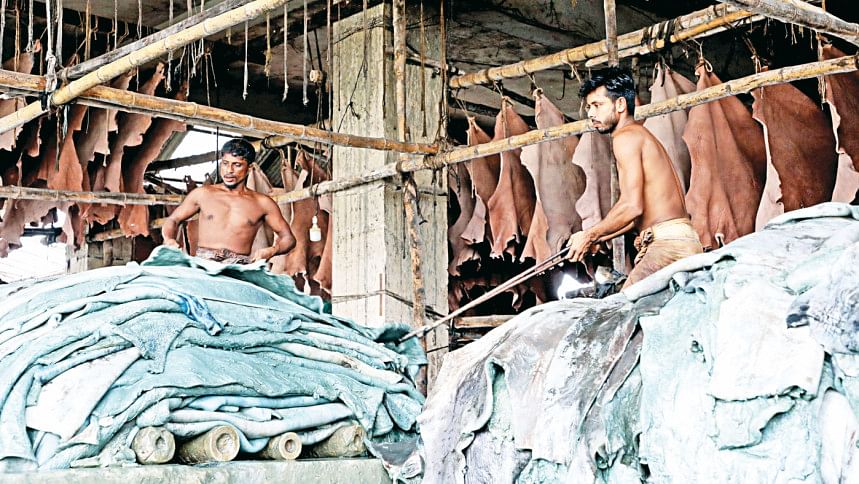Lack of compliance proves costly for leather sector

A lack of compliance is preventing the leather sector in Bangladesh from tapping its potential and expanding its footprint in the international market despite the availability of raw materials locally.
As a result, exporters are getting 30 per cent to 40 per cent lower prices for their products in the global market compared to competitors. The fair price can't be ensured in the local markets as well.
Leather, leather products and leather footwear exports climbed 32.97 per cent to $1.01 billion in the first 10 months of the current fiscal year, surpassing the whole amount raked in the previous financial year, data from the Export Promotion Bureau showed.
But both the government and researchers believe that the export earnings could go up to $12 billion by 2030.
"The leather sector is not doing well due to non-compliance," said M Abu Eusuf, a professor at the development studies department in the University of Dhaka.
"So, Bangladesh is getting around 30 to 40 per cent lower prices for export-oriented products."
"The problems in the leather sector have already been identified. Now, strong initiatives are needed to address them."
Syed Nasim Manzur, president of the Leathergoods and Footwear Manufacturers & Exporters Association of Bangladesh, said the global supply chain of leather goods has almost broken due to the Covid-19 pandemic and the ongoing Russia-Ukraine war.
And there is a scope to raise the country's share in the global leather and footwear market, but it is not being possible due to non-compliance, he said.
They spoke at a webinar titled "An Assessment of the Impact of Covid-19 on Tanneries", jointly organised by The Asia Foundation, the Research and Policy Integration for Development (RAPID), and the Economic Reporters' Forum (ERF).
The assessment is based on a worker survey involving 120 labourers and an employer survey involving 20 tanneries located at the Savar Tannery Industrial Estate.
During the interviews, tannery owners said they are working hard to get the certification from the Leather Working Group, the global body for compliance and environmental certification in the leather and leather goods sector.
"The standard of the CETP has not reached the level required for the LWG certification. Further modification and modernisation will be required," Prof Eusuf told The Daily Star.
Now, in the absence of the accreditation, local exporters have to export leather at rates about 40 per cent lower than the going rates in the international markets to China, which accounts for about 60 per cent of the tanned leather produced in Bangladesh.
Similarly, finished goods exporters have to import rawhides from LWG-certified factories in other countries to ship products to the developed markets.
Manzur, also the managing director of Apex Footwear, said since independence, the export of rawhides has declined by 79 per cent while the export of finished leather has gone up by 80 per cent.
"This indicates that local entrepreneurs are not being able to use locally available rawhides mostly because of the non-implementation of policies."
Industries Secretary Zakia Sultana said Bangladesh could earn $10 billion to $12 billion per year from the leather and leather goods sector if it is nurtured and monitored properly.
She said there are many challenges in the sector. The major one is solid waste management, according to a press release from the webinar organisers.
"Companies from the EU, Italy, and India are coming to us, but we are not getting suitable offers from them," she said, adding that ensuring a fair price of leather is a challenge and marginal businessmen don't get the desired price.
Speaking about the CETP, the secretary said the previous ETP and the current ETP are not the same as chemicals of 109 nozzles have already been ensured. However, it has not been possible to clear one module, she said.
"The compliance of the ETP is now good compared to the past," she said, adding that the government plans to set up a CETP in Rajshahi.
According to the RAPID assessment, the previous tannery plots at Hazaribagh must be released by the Rajdhani Unnayan Kartripakkha (Rajuk) as soon as possible.
The plots have been marked as the "red zone" by the Rajuk since 2017. As a result, tanneries can't sell them.
But they are required to pay Tk 800 crore in interest every year on their previous loans amounting to Tk 8,000 crore. If the Rajuk releases the plots, the tannery owners will be able to sell them and repay their loans, said the RAPID.
Responding, Sultana said the industries ministry is in talks with the Rajuk to bring Hazaribagh out of the red zone.
The assessment called on the Department of Environment to issue environmental clearance certificates to tanneries based on their performance as soon as possible since securing the accreditation is one of the primary requirements for getting the LWG certification.
Prof Eusuf proposed forming a Leather Development Authority under the Prime Minister's Office to ensure the management and development of the sector.

 For all latest news, follow The Daily Star's Google News channel.
For all latest news, follow The Daily Star's Google News channel. 






Comments